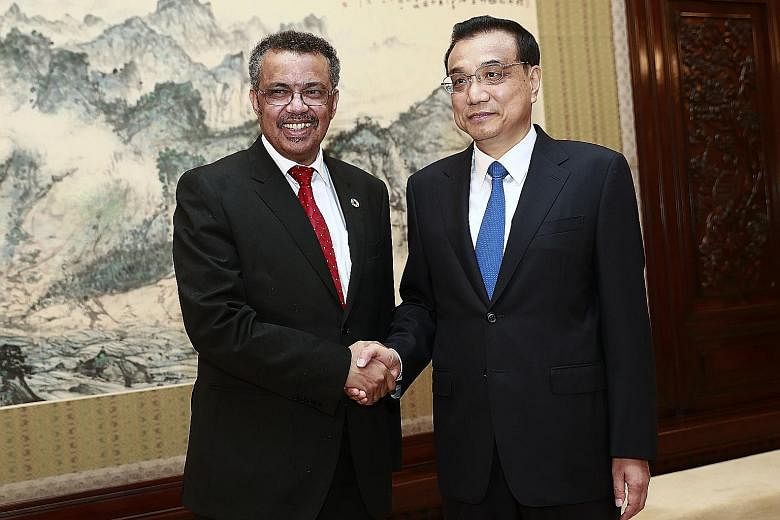China has signalled that it intends to play a leading role in public health globally, announcing a slew of programmes yesterday in partnership with the World Health Organisation (WHO).
Under its Health Silk Road initiative, China will create a global platform to facilitate information-sharing on communicable diseases, and boost the use of traditional Chinese medicine (TCM). It will also roll out mother-and-child and reproductive health projects to states under its Belt and Road Initiative (BRI).
The BRI is Beijing's ambitious plan to connect China with countries in Europe, Asia and beyond via infrastructure projects and trade.
The programmes were adopted at the Belt and Road High-Level Meeting for Health Cooperation in Beijing. The event, attended by about 300 health officials and ministers from 30 countries including Singapore, Cambodia and Mongolia, as well as senior WHO officials, ends today.
China also signed almost 20 cooperation documents to deepen its partnerships around the world, including ones with the Joint United Nations Programme on HIV/Aids and a Singapore TCM company.
WHO director-general Tedros Adhanom hailed the Chinese-led initiative as visionary, at a time when the world is at greater risk of disease outbreaks.
Disasters and pandemics also have greater impact today because of globalisation, he said, noting that "this is why a global initiative that elevates health to the centre of economic and social development is immensely encouraging".
In her keynote speech at the meetings yesterday, Vice-Premier Liu Yandong alluded to Beijing's growing soft power and capabilities in handling global public-health emergencies, saying China is "an active advocate and firm practitioner of global health cooperation".
She recounted China's "swift response" after Typhoon Haiyan hit the Philippines in 2013, the Ebola outbreak in West Africa in 2014 and the devastating earthquake that struck Nepal in 2015.
"Helping to build global public health and safety has contributed to China's power," she said. "We hope to strengthen cooperation with the international community, and contribute more 'China Wisdom' to the development of human health."
One key goal in the initiatives is to expand TCM understanding and use, in the same way that Chinese herbal medicines were widely used and traded during the heyday of the ancient Silk Road, said Ms Liu.
China aims to issue 20 TCM international standards, register 100 TCM products and build 30 overseas TCM centres in BRI countries by 2020.
Another key target is increasing exchanges between researchers and healthcare professionals, for instance, through a new hospital alliance and a health policy research network.
WHO director for service delivery and safety Edward Kelley said China's experience in reforming its hospitals to improve areas such as governance and service quality can serve as a guide for other developing countries. He said: "There are definite policy levers and activities that can be undertaken by countries, and China's experience in this area will be invaluable to others."
Singapore's Senior Minister of State for Health and Transport, Dr Lam Pin Min, who is in Beijing for the meetings, said China's initiative will not only raise healthcare quality in BRI countries, but also spur research and innovation in medicine and enhance countries' surveillance of communicable diseases.
Dr Adhanom agreed: "China has much to teach us about these issues. It's a world leader in disease surveillance and outbreak control, and was one of the first countries to step in during the Ebola outbreak."

